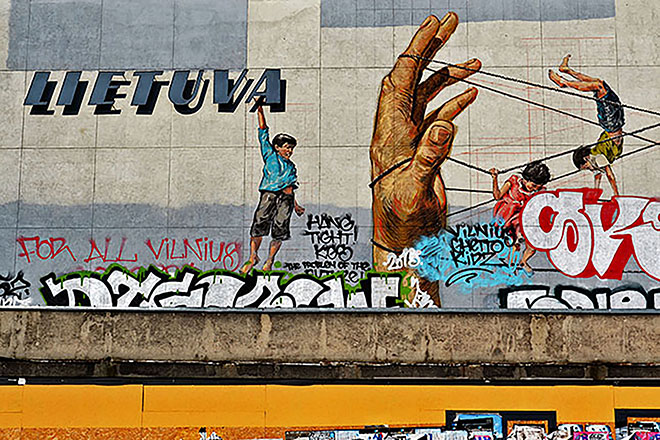
They have undergone the Soviet yoke for fifty years. They are the only EU countries to have been part of the USSR, although they have nothing in common with Russia, nor by language nor religion. Aside from bad words.
There are still people who, when talking about Estonia, Latvia and Lithuania, ask whether their language is Russian. And when you say no, then they ask if sounds like Russian. And when thou yet say no, that Estonians speak a Finno-Ugric language while Latvians and Lithuanians are the last who speak a Baltic language, one thing comes to your mind: bad words.
Because in 25 years of independence from the USSR, the Baltic wasted no time to get rid of the heavy Soviet legacy. The claim – still very strong, since the years of perestroika – is to be European countries in the full sense, by culture, history and traditions. Not to share anything – besides a border – with the russkij mir, the Russian world made of Cyrillic alphabet and Orthodox religion. Vilnius, Riga and Tallinn have already scrapped in a few years whatever might remember the Soviet presence (and in a broader sense, Russian) on their territory, from street names to monuments, from architecture to customs. A flash de-sovietization – especially compared to that for example of Ukraine that still drags – that has left behind a trail. Profanity.
Geopolitics and bad words
Take the example of Lithuania: a language without profanity. Not, at least, of those that you cannot say in front of children. The ultimate triviality that Lithuanian language can express is in words like po velniais, “bothereation”, po Perkūnais, “by Jove,” and šūdas, “shit.”
But when a Lithuanian gets really pissed off, that’s obviously not enough. And here emerges the “Russian” past. Which is full of strong and colorful expressions indeed. In fact, the various, bljat’, kurva, pohuj, nahuj, pizdets – all untranslatable in this column, but similar to the worst foul language that we can imagine – are very present in the Lithuanian vocabulary.
I don’t know if anyone has ever study the relation between swear words and geopolitics, but this could be a case to be examined. The Baltics still have the nerve towards the Russians. And I know more than one that feels a perverse pleasure in having to resort to the Russian language to get currish. It’s like give Russia a single role, that of vulgarity and obscenity.
No coincidence Agnese Krivade, a popular Latvian poet, has chosen to tell the Latvian relationship with the Russians of Latvia exactly with the use of the words bljat’ and atpizdets, in his poem “Ō”.
An unresolved bereavement
An oddity that today really takes on a meaning that goes beyond the language. For three years now, the Baltics feel like living on a virtual front line. The Russians and Russian speakers who remained after independence from the USSR continue to be the product of a bereavement still unresolved after over twenty five years. Just look at the case of nepilsona, the Russians who were born in Latvia, have been deprived of Latvian citizenship and turned into de facto displaced persons.
Latvia itself is among the three countries the one with the largest Russian population. Daugavpils is a kind of Donetsk on the Baltic Sea. And the Latgale, the region that borders Russia, a kind of Donbass. But Estonia has something similar in Narva, the city right on the border with Russia
Indeed, the Russian presence looms large from beyond the border over the Baltic collective imagination. So much so that the hypothesis of an invasion is no longer driven away with a shrug: Estonia is training an army to be ready for partisan warfare, Lithuania distributes manuals for armed resistance in schools and Latvia is giving out night vision goggles and weapons to keep at home. Because, if it ever gets the day, they won’t defend themselves with just swear words.
@daniloeliatweet
They have undergone the Soviet yoke for fifty years. They are the only EU countries to have been part of the USSR, although they have nothing in common with Russia, nor by language nor religion. Aside from bad words.
There are still people who, when talking about Estonia, Latvia and Lithuania, ask whether their language is Russian. And when you say no, then they ask if sounds like Russian. And when thou yet say no, that Estonians speak a Finno-Ugric language while Latvians and Lithuanians are the last who speak a Baltic language, one thing comes to your mind: bad words.






